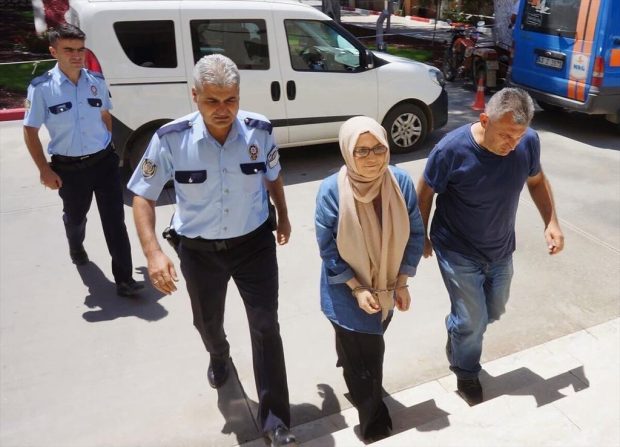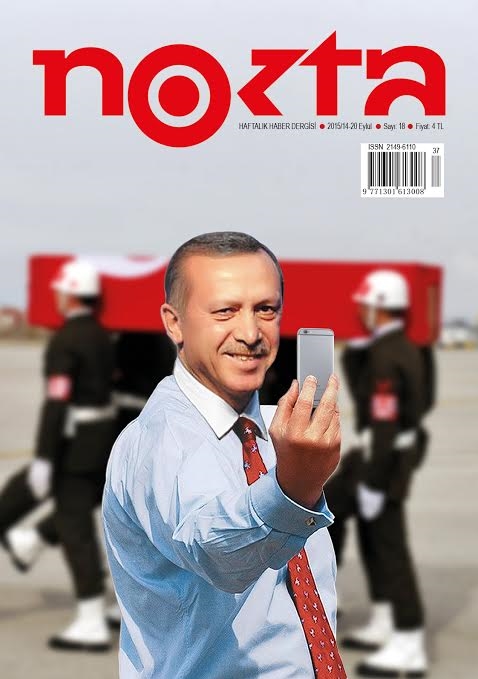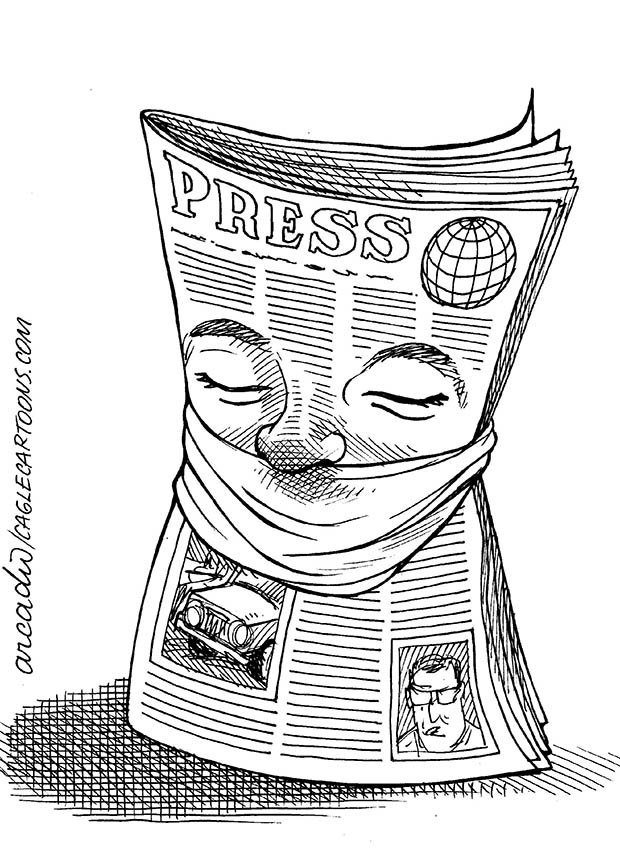28 Jul 2016 | mobile, News, Turkey

Büşra Erdal, one of 89 journalists subject to arrest, surrendered in Manisa and was taken to police headquarters in handcuffs.
Media freedom must be treated for what it really is: a strong test of democracy. And any response to a crisis requires a cautious approach if basic civil liberties, the building blocks of any free society, are to be protected. Make no mistake about it, in the case of Turkey, we are faced with a situation where authorities are violating the basic human right of Turkish citizens to engage in free media.
Just consider the following media freedom issues that have taken place after the attempted coup in Turkey on 15 July.
- The authorities have ordered the closure of 45 newspapers, 15 magazines, 16 television channels, 23 radio stations, 3 news agencies, and 29 publishers;
- Arrest warrants have been issued against 89 journalists, accusing them of supporting terrorism; seven of them have already been detained;
- 370 journalists at the state broadcaster TRT have been suspended;
- Press accreditations for 34 journalists from eight other Turkish media outlets have been revoked;
- 60 staff members with Cihan News Agency have been fired;
- The Radio and Television Supreme Council of Turkey (RTÜK) has cancelled the licenses of more than 20 radio and television stations;
- The Telecommunications Authority (TIB) has blocked more than 20 news websites.
These issues must also be put in the context of the general, sharply deteriorating media freedom situation in Turkey in the past few years. An anti-terror law in Turkey, in effect since 1991, is being used to round up terrorists but also many others, including those who it is my job to lobby for – journalists and media.
Today there are dozens of journalists in jail in Turkey, prosecuted and convicted mostly under a law designed to fight terrorism and protect people. The number of journalists jailed in Turkey is without precedent in the OSCE region. Under the anti-terror law, merely reporting on controversial topics could land a journalist in court.
The latest case in a string of the recent crackdown activities on media in Turkey is the detention of seven journalists in the last two days, while arrest warrants were issued against several dozens more, accusing them of supporting terrorism. To say that dissenting voices, although still present and persisting, are under duress in Turkey is a severe understatement.
The authorities’ systematic abuse of media and its players, done with the intention of guaranteeing control of the media landscape, is nothing short of a clear and present threat to democracy in the country.
Media-freedom advocates like myself, must and will continue to raise our voices and provide the defenses necessary for free expression and free media to flourish in Turkey.
I will raise the issue of the rights of media and of journalists before national legislatures. I will engage in public awareness campaigns on behalf of free media. I will continue to do everything in my power to protect and safeguard the independent and pluralistic voices that are the cornerstones of any society. And I will call on elected officials to spend the resources, including political capital, essential to build environments conducive to free expression.
I believe that a society that respects human rights is working towards the common good of its people and that limiting and breaching fundamental democratic and civil liberties negatively affects the common good. I also believe that the role of elected officials is to write good laws and appoint good law enforcement authorities, including police, prosecutors and judges to interpret those laws in a manner that will make free expression possible.
All democratically elected governments must adhere to the underlying rules of their society – free markets, universal suffrage, access to government information and other basic civil liberties, including a free and pluralistic media environment.
Freedom of expression is a universal and basic human right; it does not stop at views deemed appropriate by the authorities. It remains the role of journalists to inform people of public issues, including highly sensitive issues. And it remains the role of the authorities to ensure that journalists, no matter how critical or provocative, can do so freely and safely. Turkey fails on this account.
More commentary from Dunja Mijatović
Why quality public service media has not caught on in transition societies
Chronicling infringements on internet freedom is a necessary task
Propaganda is ugly scar on face of modern journalism
More about Turkey
Yavuz Baydar: Erdogan is ruling Turkey by decree
Can Dündar: Turkey is “the biggest prison for journalists in the world”
Turkey’s film festivals face a narrowing space for expression
23 Jul 2016 | Academic Freedom, Campaigns -- Featured, Europe and Central Asia, Mapping Media Freedom, mobile, News, Turkey, Turkey Uncensored
 It was at the early hours of Friday that a journalist sent a note to her colleagues.
It was at the early hours of Friday that a journalist sent a note to her colleagues.
“We are told by the management that our publication is discontinued with immediate effect,” she said. “We are told to pack our belongings and leave the office. You can’t imagine how sad I am.”
The weekly news magazine Nokta, which had been launched in the aftermath of a military coup in 1980s, is no more.
Lately, under a new management, Nokta belonged to the critical mass of what remained of independent journalism in Turkey, with long reads and popular, bright commentators such as Perihan Mağden and Gükhan Özgün.
My colleague went on to say that the management internal communique cited the loss of a printing house as the reason for the closure. Given the waves of restriction over basic freedoms in the wake of Emergency Rule declared in 81 provinces of Turkey, this explanation came as no surprise.
Commenting on the closure, a Kurdish colleague who has extensively covered the operations in Cizre and Diyarbakır, added: “It’s a disaster to have the media outlets shut down, but it’s even worse to see media professionals left without a job.”
In another incident, Paolo Brera, a well-known reporter with La Repubblica, was held by the police officers at Sultanahmet Square yesterday while interviewing tourists, and taken to police headquarters. At first his whereabouts were unknown, and Italy had to intervene at the highest level to have him released after four hours.
As of Friday afternoon the situation of the columnist and human rights lawyer Orhan Kemal Cengiz was unclear. Cengiz is an international figure and close friend of the Kurdish lawyer Tahir Elçi who was assassinated in Diyarbakır last summer. Among other assignments, Cengiz followed the case of Christian missionaries slain in Malatya in 2007. He attended the UN’s Human Rights Summit in Geneva some months ago, commemorating by explaining the situation to a larger audience. His colleagues are on standby, knowing that he is held at the Anti-Terror Unit in Istanbul. His wife, also a lawyer, had been told that the detention was related to a case from 2014, but nobody has any further details.
The Emergency Rule means that no lawyers other than those appointed by the bar associations are now allowed to have access to all the cases. What is also known is that those who are arrested are held in cells at police headquarters.
Justice Minister Bekir Bozdağ said in an interview yesterday that in “crimes related to terrorist activities” individuals can be detained for at least seven-to-eight days. “Our staff is working on the possibilities of even extending that time,” he said, adding that he shares the concern that it will be very difficult to distinguish innocents from criminals.
The overall situation continues to be opaque, with scarce information, and experienced journalists caution each other to compare what’s being officially stated with what’s really being done. The measures so far leave little doubt that the media and the academia are under severe pressure, and the growing concern is there is an escalation of a clampdown, without much explanation of what the media and academic freedom had to do with the very coup attempt itself.
A version of this article was originally posted to Suddeutsche Zeitung. It is published here with permission of the author.

Turkey Uncensored is an Index on Censorship project to publish a series of articles from censored Turkish writers, artists and translators.
31 May 2016 | Events, Middle East and North Africa

The New Arab news network invites you to a panel discussion to discuss the challenges faced by the media and journalists in the post-Arab Spring era. The Arab Spring of 2011 presented hope for a region free from dictatorial rule and media constraints, but since the people’s uprising, much the opposite has happened. The Arab world is still plagued by media censorship, and independent journalism and objective coverage can be a life-threatening exercise.
The Arab Spring of 2011 presented hope for a region free from dictatorial rule and media constraints, but since the people’s uprising, much the opposite has happened. The Arab world is still plagued by media censorship, and independent journalism and objective coverage can be a life-threatening exercise.This discussion will explore the current state of the media in the region and the future of press freedom in the wider Arab world.
This discussion will explore the current state of the media in the region and the future of press freedom in the wider Arab world.
Hosted and Chaired by SNP MP Tommy Sheppard.
Speakers Include:
– Faitma El-Issawi, research fellow, LSE Middle East Centre
– Melody Patry, advocacy officer at Index on Censorship
– Abdu Elshayyal, CEO of The New Arab
When: Wednesday, 15 June 2016 from 5.30-7pm
Where: Conference Room 15, House of Commons, London, SW1A 0AA (view map)
Tickets: Free, but registration is required.
4 Mar 2016 | Campaigns, mobile, Statements, Turkey, Turkey Statements
Index has joined with writers, journalists and artists around the world to condemn the seizure of Turkish independent media group, Zaman, and to sign the following:
“Today Turkey seized one of the country’s leading newspapers, Zaman. In so doing, Turkey has confirmed that it is no longer committed to a free press, which is the bedrock of any democratic society.
We, the undersigned, ask the court to reverse its decision to seize Zaman and urge the international community to speak out against Turkey’s repeated attempts to stifle a free and independent media.”
—
Index de, dünyanın dört bir yanında olan yazarlara, gazetecilere ve sanatçılara katılarak Türkeyenin bağımsız medya grubuna devletin el koymasını kınıyor ve asağıdakini imzalayın:
“Bugün Türkiye devleti, ülkenin önde gelen gazetelerinden biri olan Zaman gazetesine el koydu. Bunu yapmasi ile, Türkiye özgür basına artık bağlı olmadığını doğruladı, oysa özgür basın bütün demokratik toplumların temelidir”.
Biz, altında imzasi bulunan kişiler, mahkemeden Zaman gazetesine kayyum atanması kararını geri çekmesini talep ediyor ve Uluslararasi toplumdan Türkiye devletinin defalarca özgür ve bağımsız medya’yı bastırmaya çalışmasına karşı açıkca konuşmasını önemle tavsiye ediyoruz.
—
Signed
All the staff at Index on Censorship
David Aaronovitch, journalist and chair of Index on Censorship
Ricardo Gutierrez, general secretary, European Federation of Journalists
Christophe Deloire, executive director, Reporters Without Borders (RSF)
Barbara Trionfi, executive director, International Press Institute
Rafael Marques de Morais, investigative journalist, MakaAngola.org
Tim Stanley, Telegraph columnist
Neil Mackay, editor, Sunday Herald, Glasgow
Molly Crabapple, artist and author
Richard Sambrook, professor of journalism, Cardiff University
Tom Holland, historian and author
Matthew Parris, writer and broadcaster
Amberin Zaman, journalist
Peter Kellner, author and writer
James Ball, special correspondent, Buzzfeed
Rupert Myers, political correspondent, GQ
Peter Pomeranzev, journalist and author
Peter Oborne, journalist
Philip Pullman, author
Jacob Mchangama, executive director, Justitia
Tamas Bodoky, editor-in-chief, atlatszo.hu
Kevin Maguire, associate editor, The Mirror
Ariel Dorfman, playwright
Mary Fitzgerald, editor in chief, OpenDemocracy.net
Catherine Mayer, journalist and author
Karin Deutsch Karlekar, Ph.D.
Ian Birrell, journalist and co-founder of Africa Express
Anthony Barnett, founder, openDemocracy
Tony Gallagher, editor-in-chief, The Sun
Maria Polachowska, journalist
Nick Dawes, chief content and editorial officer, Hindustan Times
tOad, cartoonist
Dave Brown, political cartoonist, The Independent
Sir Stephen Sedley, QC
Raymond Louw, journalist
Samm Farai Monro, comedian, writer and producer
Paul Dacre, editor, Daily Mail
Greg Lukianoff, president and CEO, Foundation for Individual Rights in Education (FIRE)
Add your support on the petition at Change.org


 It was at the early hours of Friday that a journalist sent a note to her colleagues.
It was at the early hours of Friday that a journalist sent a note to her colleagues.
